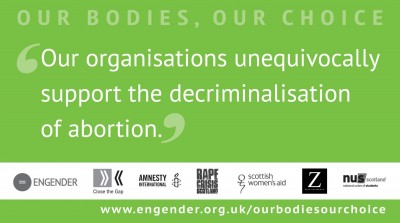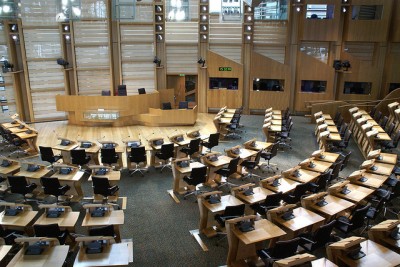Engender blog
Guest post: Abortion in Scotland - The facts behind the figures
Juliet Swann is a policy and parliamentary consultant, Engender board member, and an expert on all things to do with participation in democracy. Here she takes a look at the facts behind recently reported polling figures on attitudes towards abortion in Scotland:
Scotland must take this chance to stand up for women's reproductive rights
This blog first appeared on OpenDemocracy.
It’s been a depressing year for anyone who cares about a woman’s right to choose (ok, it’s been a depressing year for everyone, but bear with me).
2016 has seen women imprisoned in Northern Ireland for accessing safe abortion pills online, or for helping other women to. Women in Poland have had to take to the streets to prevent a blanket ban on abortion even in cases of rape. And this month, senators in Ohio made progress towards a ban on abortion after 6 weeks – a time period in which many women don’t even discover they are pregnant, let alone have time to consider their options.
Our bodies, our choice: the case for a Scottish approach to abortion

Today Engender has released a key report highlighting current issues affecting access to abortion in Scotland, and calling on the Scottish Government to use the opportunity presented by the devolution of abortion law to put women’s equality and rights at its heart. The report, supported by Amnesty Scotland, NUS Scotland, Scottish Women’s Aid, Rape Crisis Scotland, Close the Gap, and Zero Tolerance, calls for abortion to be decriminalised, and for improvements to services, access, and education around abortion.
Engender calls for a progressive law for Scotland.
With the news that control over abortion law is due to be devolved to the Scottish Parliament, Engender is calling for a progressive approach to abortion that reflects the fact that it a health issue that also underpins women’s autonomy and equality with men.
In July, Engender was one of several organisations to sign a joint statement urging caution over the devolution of abortion as part of the Scotland Bill. We are not opposed to the devolution of abortion to Scotland, but were concerned that the haste of the Smith process and the Scotland Bill itself may lead to a reduced timetable for discussing the content of any abortion law. We are disappointed that engagement with civil society, and the women’s sector, did not form part of the UK Government’s decision-making in seeking to amend the Scotland Bill.
Despite the flaws in the process, we are now keen to work with women’s and equalities organisations, trade unions and all political parties to ensure that abortion law in Scotland adequately reflect the needs and priorities of women in Scotland. Internationally, abortion law-making can be a highly politically charged process. We must take this opportunity to ensure that Scotland gets this right the first time, and that we create abortion laws with women’s dignity, autonomy, and wellbeing at their heart.
5 things you need to know about equality and today's Scotland Bill debate
 With amendments to the Scotland Bill falling like leaves, it doesn't seem likely that any of the positive equality amendments being debated on Monday are likely to make it into the statute books.
With amendments to the Scotland Bill falling like leaves, it doesn't seem likely that any of the positive equality amendments being debated on Monday are likely to make it into the statute books.
The (too) rapid progress of the Bill through the House of Commons means that some of the detail is passing in a bit of a blur. By any forecast, the use of some of the powers that are being transferred will happen within what seem to be extraordinarily narrow parameters. As we see the constraints on the Scottish Parliament in action there are likely to be additional awkward questions about whether the new Scotland Act can really be said to have delivered on the spirit of some of the commitments outlined in the Smith Agreement.
We think there are five important things to note about women's equality and today's debate.
Downloads
 Engender Briefing: Pension Credit Entitlement Changes
From 15 May 2019, new changes will be introduced which will require couples where one partner has reached state pension age and one has not (‘mixed age couples’) to claim universal credit (UC) instead of Pension Credit.
Engender Briefing: Pension Credit Entitlement Changes
From 15 May 2019, new changes will be introduced which will require couples where one partner has reached state pension age and one has not (‘mixed age couples’) to claim universal credit (UC) instead of Pension Credit.
 Engender Parliamentary Briefing: Condemnation of Misogyny, Racism, Harassment and Sexism
Engender welcomes this Scottish Parliament Debate on Condemnation of Misogyny, Racism, Harassment and Sexism and the opportunity to raise awareness of the ways in which women in Scotland’s inequality contributes to gender-based violence.
Engender Parliamentary Briefing: Condemnation of Misogyny, Racism, Harassment and Sexism
Engender welcomes this Scottish Parliament Debate on Condemnation of Misogyny, Racism, Harassment and Sexism and the opportunity to raise awareness of the ways in which women in Scotland’s inequality contributes to gender-based violence.
 Gender Matters in Social Security: Individual Payments of Universal Credit
A paper calling on the Scottish Government to automatically split payments of Universal Credit between couples, once this power is devolved to the Scottish Parliament.
Gender Matters in Social Security: Individual Payments of Universal Credit
A paper calling on the Scottish Government to automatically split payments of Universal Credit between couples, once this power is devolved to the Scottish Parliament.
 Gender Matters Manifesto: Twenty for 2016
This manifesto sets out measures that, with political will, can be taken over the next parliamentary term in pursuit of these goals.
Gender Matters Manifesto: Twenty for 2016
This manifesto sets out measures that, with political will, can be taken over the next parliamentary term in pursuit of these goals.
 Scottish NGO Briefing for UN Special Rapporteur on Violence Against Women
Joint briefing paper for the UN Rapporteur on Violence Against Women.
Scottish NGO Briefing for UN Special Rapporteur on Violence Against Women
Joint briefing paper for the UN Rapporteur on Violence Against Women.

Newsletter
Sign up to receive our newsletter here:
Sign up to our mailing list
Receive key feminist updates direct to your inbox: